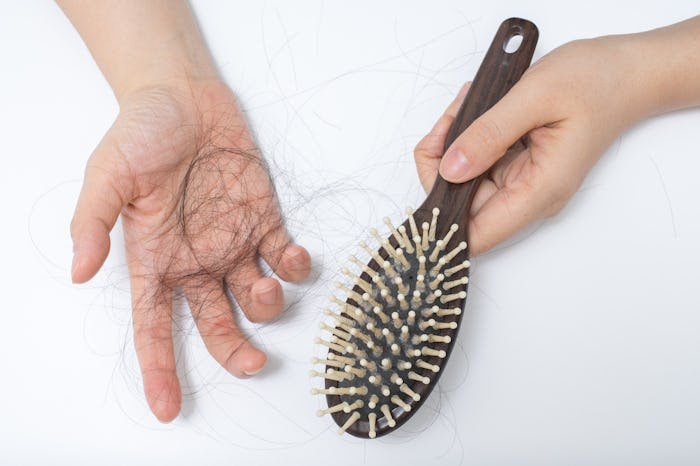Life

Can You Prevent Postpartum Hair Loss?
I have this terrible habit of taking the hairs that fall out when I shampoo, sticking them to the shower walls, curling them into a little hairball, and then tossing it in the trashcan so that it doesn't clog the drain. Sometimes, however, I forget to throw it out. On more than one occasion I've scared the life out of my husband who thought he had come face-to-face with a giant spider or cockroach in our shower. The size of these hairballs became significantly bigger in the months after giving birth. I've always wondered, "can you prevent postpartum hair loss?"
A couple of days before I found out that I was pregnant with my son, I got a really short haircut. I attributed my new lack of hair loss to the removal of years worth of damaged locks. What I didn't realize is that, according to the American Pregnancy Association (APA), the increase in estrogen during your pregnancy causes more of your hair to be in the growing phase and fewer in the resting phase. This means fewer hairs are resting, or getting ready to shed. However, as the APA mentioned, the drop in estrogen after delivery causes up to 60 percent of your hair to enter the resting state. And those are the hairs that eventually fall out.
This is a normal and natural part of pregnancy, and you can't prevent your hair from entering the resting stage. However, here are some ways you may be able to reduce the amount of hair that falls out postpartum.
1Take A Postnatal Vitamin
Just because you're no longer pregnant doesn't mean you should stop taking vitamins. Hair loss can be exacerbated by a vitamin deficiency. The APA recommended that new mothers take a postnatal vitamin that will keep them healthy while nursing and may help prevent hair loss due to vitamin deficiency.
2Use A Wide Tooth Comb
Using a tightly bristled brush on wet hair can cause damage on healthy hair, which will increase the amount of hair you lose. Even if you can't prevent your resting hair from falling out, you can help prevent damage to your growing hair by using a wide tooth comb.
3Use Biotin
The APA recommends using shampoos that contain biotin, which is often used to treat brittle hair and nails. You can also ask your doctor about taking a biotin supplement.
4Avoid Tight Braids
Braids, cornrows, pig tails, hair rollers and extensions can cause stress to your hair, according to the APA, making it more susceptible to breakage and hair fall.
5Try A Hair Mask
The Health Site recommended a yeast hair mask to help reduce the amount of hair loss after pregnancy. Yeast contains folic acid, riboflavin and biotin. It also makes your hair stonger and shiny. You can also try a fenugreek hair mask. According to The Health Site you can soak fenugreek seeds in a bowl overnight, strain the liquid and use it to massage the scalp. Next, wrap your head with a towel for four hours, and follow by shampooing as usual.
6Massage Your Scalp
Hair loss can also be reduced by massaging your scalp with almond oil or castor oil according to the Health Site. The site recommended massaging your scalp once a week with a mix of both oils.
7Avoid Heat Styling
Blow drying, curling irons, and flat irons can contribute to hair loss. These tools can burn the ends and damage the roots of your hair.